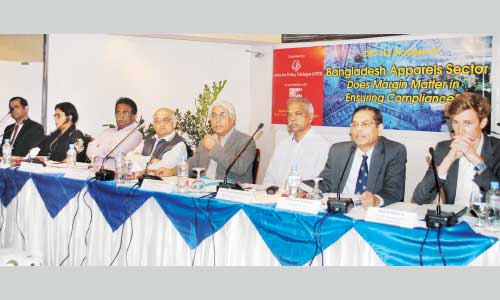Buyers should raise RMG price for compliance cost
Economists, entrepreneurs and workers rights activists on Wednesday demanded that international buyers should pay a portion of compliance costs through increasing the price of products sourced from Bangladesh.
They said that it would be very difficult for Bangladeshi manufacturers to increase spending to meet compliance under the existing level of price margin as international buyers offer very low prices for products compared to the prices they offer for other competitive countries including China, Vietnam and Mexico.
At a dialogue held at BRAC Center Inn in Dhaka, they also demanded adequate flow of funds for implementing corrective measures in line with the recommendations of Accord and Alliance, the two consortiums of international buyers working in the country.
The Centre for Policy Dialogue and German-based Friedrich-Ebert Stiftung jointly organised the programme entitled ‘Bangladesh Apparel Sector : Does Margin Matter in Ensuring Compliance’.
CPD additional research director Khondaker Golam Moazzem presented a study report on the issue at the programme.
‘Bangladeshi manufacturers receive low prices for products from buyers compared with their competitive countries that push them to spend lower for compliance as the cost of fabrics, trimming and packaging stands high in the country,’ said the study report.
Inevitably, Bangladesh needs to spend more in the sector, it said.
The CPD suggested the market players for building an integrated value chain in which suppliers and buyers will jointly share the responsibility for improving compliance issues.
The allocation for maintaining compliance by apparel firms needs to be increased and a part of this additional spending should come from buyers as increased cutting and making charges of products, it said.
CPD chairman Rehman Sobhan said that Bangladesh was maintaining the competitiveness only in the cheap labour cost while the cost of capital, port charges and other expenses are high in the country.
‘Cheap labour practically means that the country is getting competitiveness at the cost of workers’ health and welfare,’ he said.
CPD distinguished fellow Debapriya Bhattacharya emphasized on ensuring harmonisation in compliance standards globally.
Compliance issue should be similar for both Bangladesh and other countries such as China, Vietnam and Cambodia, he said.
Workers welfare should be the focus of compliance, he added.
Gana Shasthya Kendra trustee Zafrullah Chowdhury stressed on improving workers health, living wages for workers and law and order situation in the country for increasing productivity.
Labour secretary Mikail Shipar said that the government took various steps to ensure compliance in apparel sector including amending the labour law and rules.
The amended labour rules will be published by the end of August or early September, he said.
He said that ethical buying was most important issue at value chain for the exporters target to reach US$ 50 billion export earnings by 2021.
Opex Group chairman Anisur Rahman Sinha said that compliance issue is now a non-negotiable issue.
‘Businesses should show zero-tolerance on the issue to get business and customers. On the other hand, buyers should ensure fair and competitive prices for the products,’ he said.
When you pay lower price for products, indirectly you say to pay lower wage to workers, he said, adding that manufacturers must have a margin in business to sustain and upgrade the factories.
Mohammadi Group managing director Rubana Huq said Accord and Alliance are putting severe pressure for taking corrective measures but manufacturers are not getting funds including loan at low interest and funds from international donors though they were promised, she said.
Buyers should add compliance cost in the value chain and increase cutting and making charges of apparel items, she said.
Bangladesh Institute of Labour Stadies assistant executive director Syed Sultan Uddin Ahmed said that compliance should be self-regulation and should not depend on the conditions of buyers.
United Federation of Garment Workers president Roy Ramesh Chandra said that suppliers would have to spend a portion of their profits for upgration while buyers would have to pay more to suppliers so that no incidences like Rana Plaza happen anymore.
At the programme, CPD executive director Mustafizur Rahman, Sweden ambassador to Bangladesh Johan Frisell, FES resident representative Henrik Maihak, European Union Delegation trade adviser Zillul Hye Razi, Bangladesh Garment Manufacturers and Exporters Association director Arsahd Jamal, among others, spoke at the meeting.
- See more at: http://newagebd.net/146864/buyers-should-raise-rmg-price-for-compliance-cost/#sthash.sI1xWjDN.dpuf











